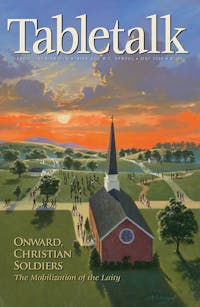
Request your free, three-month trial to Tabletalk magazine. You’ll receive the print issue monthly and gain immediate digital access to decades of archives. This trial is risk-free. No credit card required.
Try Tabletalk NowAlready receive Tabletalk magazine every month?
Verify your email address to gain unlimited access.
The laity are on the move … and they’re moving to Bristol. I serve as a pastor at Saint Peter Presbyterian Church in Bristol. We have all manner of quirks and oddities, some matters of conviction, others unexpected fruit of those convictions. What may be strangest about us is how we have grown. We have seen conversions both dramatic and ordinary. We have seen Christians come to understand the Reformed faith, and so come to our church. The second strangest “growth strategy” has been the oldest “growth strategy,” lots and lots of babies, both by natural birth and by adoption. Stranger still are the many, many families that have moved from across the country, not for jobs, but to join the church. Nearly two thirds of the families in our church have done exactly that, and they just keep coming. We are still no mega-church, and we plan to never be such. We are planting daughter parishes, congregations arranged geographically so that we might worship with those nearest to us.
I mention all this not to give an advertisement or to prompt more folks to consider a move. Indeed the session of Saint Peter Church, while thinking through our calling as it relates to God’s plans to manifest the glory of His Son, have reached only one conclusion with great certainty — His plan isn’t “Everybody move to Bristol.” I mention all this instead because of how our thinking through these issues influenced our understanding of the call of the laity. We determined that we wanted to plant churches like ours, churches that prompt people to move. While we are indeed both joyfully and vigorously a Reformed church, no one who has moved here has moved because we are the closest Reformed church. They move because of what we consider our secondary distinctives, not how we view the sovereignty of God, but how we live as a body. That, in turn, caused us to think through how we might prepare men for the ministry. We are preparing men to serve the churches we are preparing to plant. That, in turn, drove us to the locus classicus on this issue: 1 Timothy 3:2–5. Paul describes the elder as one who is “blameless, the husband of one wife, temperate, sober minded, of good behavior, hospitable, able to teach, not given to wine, not violent, not greedy for money, but gentle, not quarrelsome, not covetous; one who rules his own house well.”
Read through that list one more time, this time asking yourself, do any of these not apply to all men? Sure enough one could argue that one could be a spiritual giant without having the ability to teach. But everything else on the list is a call to all men in Christ. We discovered the obvious, that preparing men for ministry was virtually identical with preparing men to be men.
Protestants have done well to reject Romish clericalism. Luther served us all well in teaching us the priesthood of the believer. But we are not yet out of the woods. Because we are so shaped by our culture, we miss the boat here in two important ways. First, because we are pragmatists, “mobilizing the laity” means to most of us getting laypeople to man our programs at church. “The work of the ministry” has taken on this curious tint of keeping the machines running. We “mobilize the laity” by creating a rotating “service team” that puts the chairs up in the gym for Sunday morning, and takes them down again Sunday night, and another to chaperone the youth group at the local water park.
Worse still, because we are children of the Enlightenment, because we believe that education will cure all our ills, we come to Paul’s list and “mobilize the laity” by pumping them full of the one thing that distinguishes the clergy from the laity. That is, we think we are mobilizing the laity by creating an army of armchair theologians.
This is the work of ministry, to be blameless, and encourage others to do the same, to be faithful to our wives, and encourage others to do the same, to be temperate, sober minded, of good behavior and hospitable, and encourage others to do the same. The church is full of men who can parse Greek, who have earned advanced degrees, who are able teachers. These are good things, great gifts from God. But what we lack are men of character, men who will love their wives as Christ loves the church, who will raise their children in the nurture and admonition of the Lord.
It should not surprise us, for clergy cast the vision. It is only natural that they should emphasize the one thing in Paul’s list that is unique to them. We are made to teach, and we delight to have students. But the laity should be theologians enough, Bereans enough, students enough to know that their calling isn’t to become little shepherds, but that their calling is to become ever more pure sheep.
Those of us who serve as clergy, in turn, must be sober minded enough to teach the text. We must be sober minded enough to know that our goal isn’t to teach our way to carbon copies of ourselves, but to teach faithfully such that we might make copies of Christ. We must be sober minded enough to remember that the Christian life isn’t just lived in our minds. Such will not merely move the laity, but will, by the grace and power of God, move the world.
